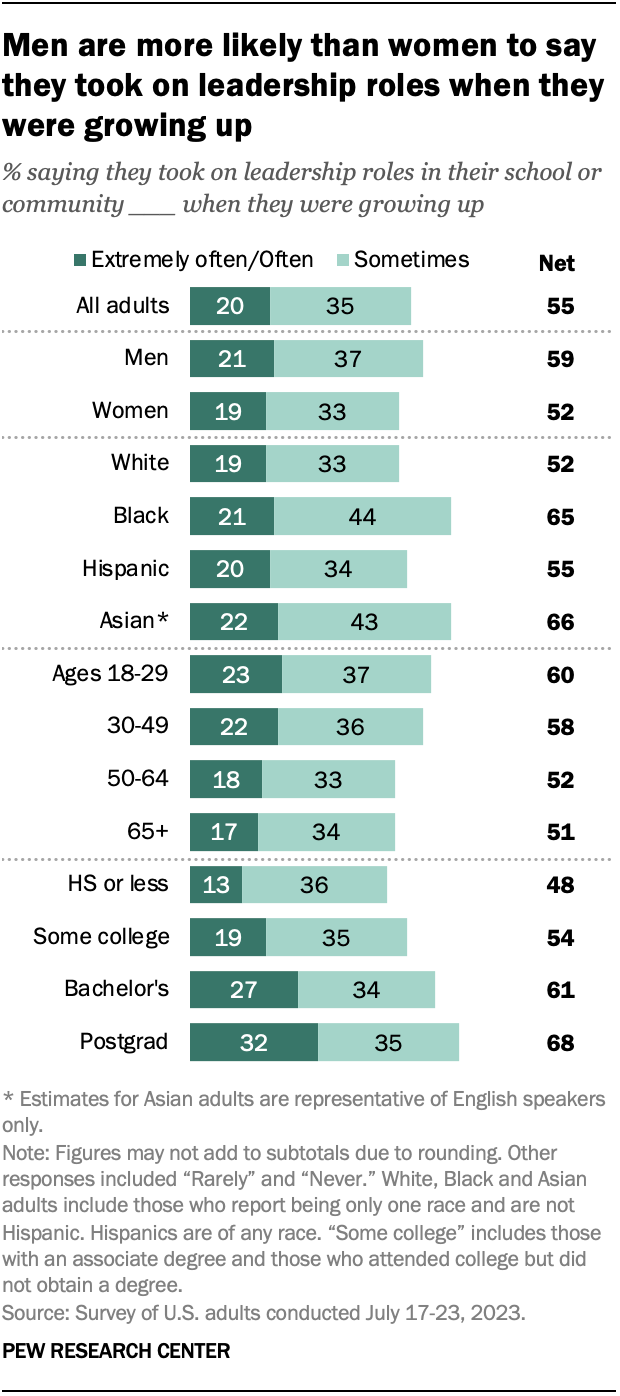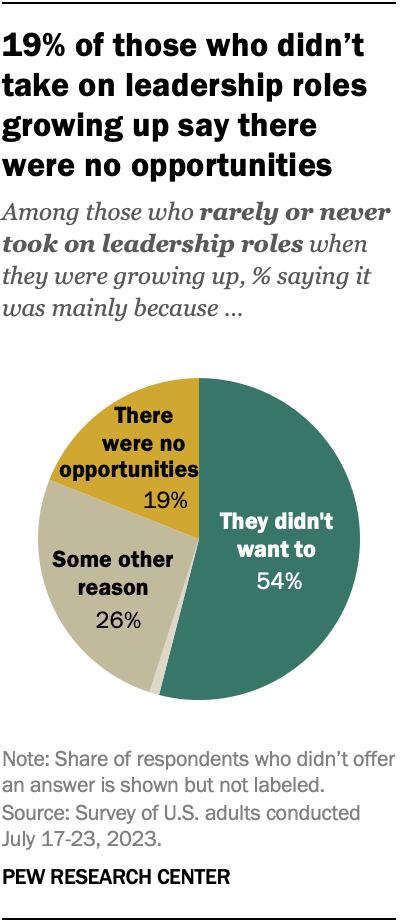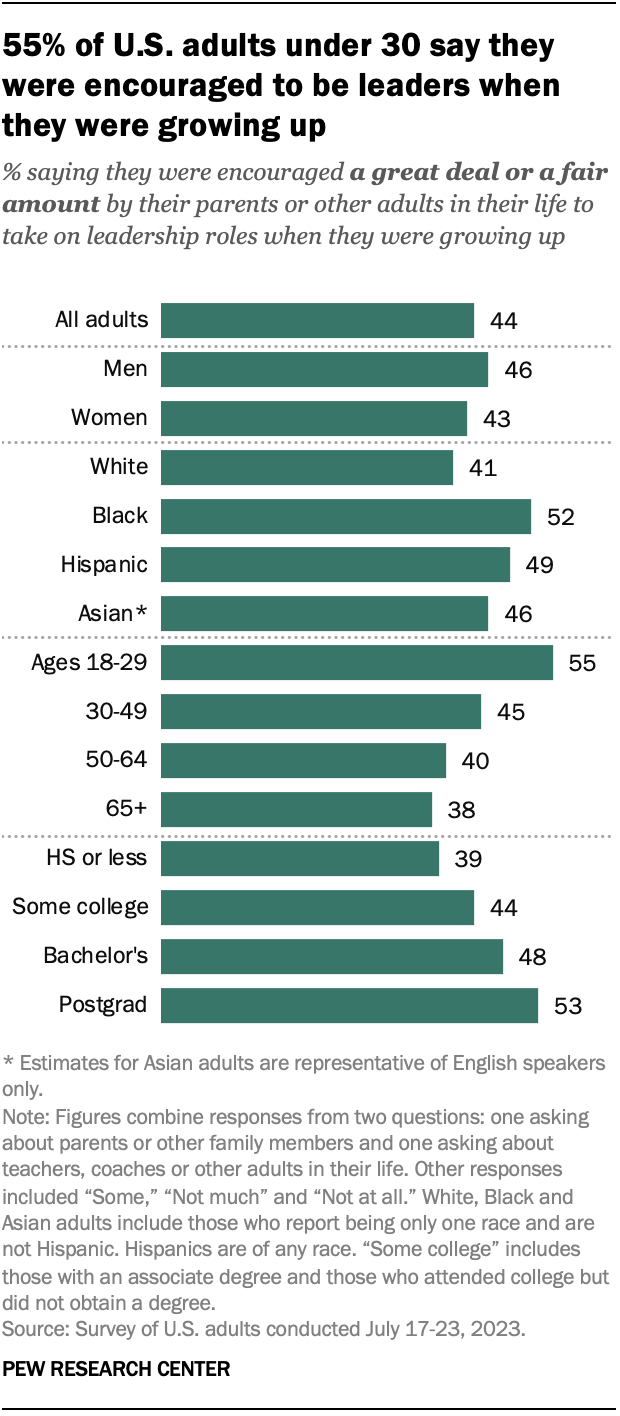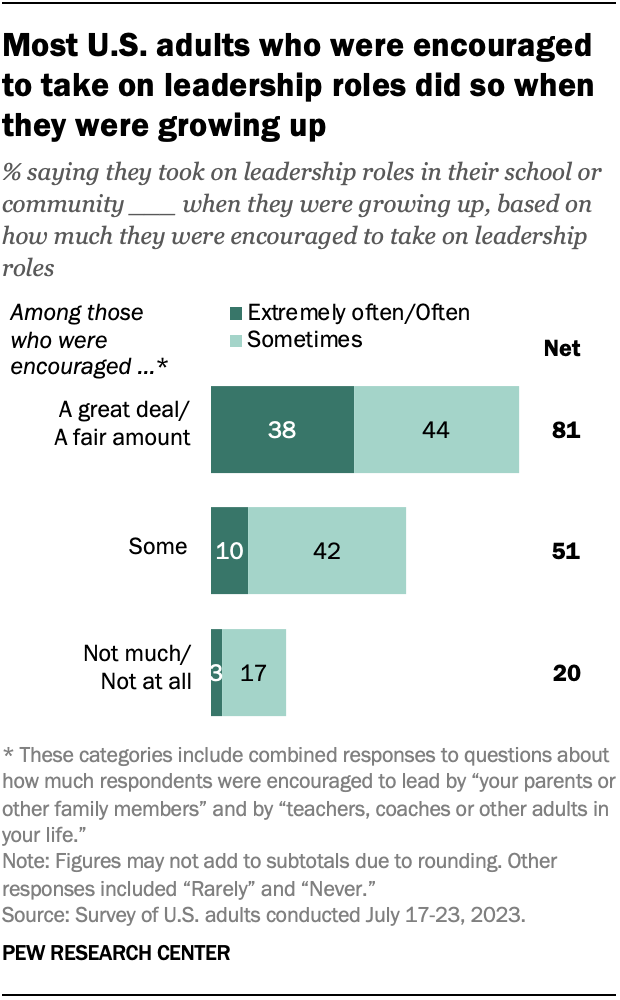
About a third of Americans say a major reason there aren’t more women in top leadership positions in politics and business is because women are not encouraged to be leaders from an early age, a recent Pew Research Center survey found.
Pew Research Center conducted this analysis to learn about Americans’ experiences with leadership when they were growing up. It is based on a survey of 5,057 U.S. adults conducted from July 17 to July 23, 2023. Everyone who took part in this survey is a member of the Center’s American Trends Panel (ATP), an online survey panel that is recruited through national, random sampling of residential addresses. This way nearly all U.S. adults have a chance of selection. The survey is weighted to be representative of the U.S. adult population by gender, race, ethnicity, partisan affiliation, education and other categories. Read more about the ATP’s methodology.
Some of the analysis combines responses from two questions about how much respondents were encouraged to take on leadership roles in their school or community by: 1) their parents or other family members; and 2) teachers, coaches or other adults in their life. Those who responded “A great deal” or “A fair amount” to at least one of these questions are coded as having been encouraged a great deal or a fair amount. “Some” includes those who said they were encouraged some in at least one of these two questions and didn’t say they were encouraged a great deal or a fair amount in either question. “Not much/Not at all” includes respondents who gave these responses to at least one of the two questions and didn’t say they were encouraged at least some in either question.
Here are the questions used for the analysis, along with responses, and the survey methodology.

We also asked over 5,000 U.S. adults about their own experiences with leadership roles when they were growing up. Here’s what we found:
Which Americans took on leadership roles when growing up?
One-in-five adults say they took on leadership roles in their school or community extremely often or often, while 35% say they did so sometimes. More than four-in-ten (44%) say they rarely or never took on leadership roles when they were growing up.
Some demographic groups are more likely than others to say they took on leadership roles at least sometimes when they were growing up. These groups include:
- Men (59% did so at least sometimes)
- Asian and Black adults (66% and 65%)
- Adults younger than 50 (59%)
- Adults with a postgraduate degree (68%)
Men younger than 50 are the most likely to say they took on these roles at least sometimes (62%), while women ages 50 and older are the least likely to say this (48%).
Why didn’t some Americans take on leadership roles when growing up?

Of those who rarely or never took on these roles growing up, more than half (54%) say it was mainly because they didn’t want to. Another 19% say it was because there were no leadership opportunities. And 26% say it was mainly because of some other reason. (We did not ask them to explain.)
Men and women give similar answers to this question, but there are some differences by age. Adults under 50 who rarely or never took on leadership roles when growing up are more likely than those 50 and older to say it was mainly because they didn’t want to (60% vs. 48%). Those in the older group are more likely to cite some other reason (30% vs. 22%), while similar shares in both groups say there were no leadership opportunities available to them (17% among those under 50 and 21% among those 50 and older).
How many Americans were encouraged to take on leadership roles when growing up?
About a third of adults (34%) say they were encouraged a great deal or a fair amount by their parents or other family members to take on leadership roles when they were growing up. And a similar share (36%) say they were encouraged to do this by teachers, coaches or other adults in their life.

Collectively, 44% say they were encouraged a great deal or a fair amount to take on leadership roles by at least one of these two groups.
There are some differences in these patterns by race and ethnicity, age, and education:
- Black (52%) and Hispanic (49%) adults are more likely than White adults (41%) to say they were encouraged a great deal or a fair amount. Some 46% of Asian adults say the same. (This share is not statistically different from the other groups.)
- 55% of adults under 30 say they were encouraged to take on leadership roles when growing up, compared with 45% of those 30 to 49, 40% of those 50 to 64 and 38% of those 65 and older.
- 53% of adults with a postgraduate degree say they were highly encouraged to take on these roles, compared with 48% of those with a bachelor’s degree, 44% of those with some college and 39% of those with a high school diploma or less education.
Similar shares of men (46%) and women (43%) say they were encouraged a great deal or a fair amount to take on leadership roles when they were growing up.
Are those who were encouraged to take on leadership roles more likely to have done so?

Of those who say they were encouraged to take on leadership roles when they were growing up, 81% say they did so at least sometimes, with 38% saying they took on these roles extremely often or often.
In contrast, 51% of those who had some encouragement and 20% of those who were rarely or never encouraged took on these roles at least sometimes when they were growing up.
Note: Here are the questions used for the analysis, along with responses, and the survey methodology.
